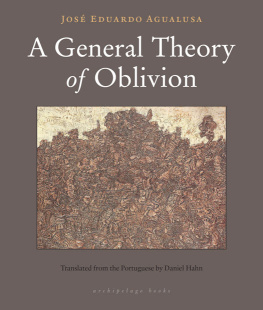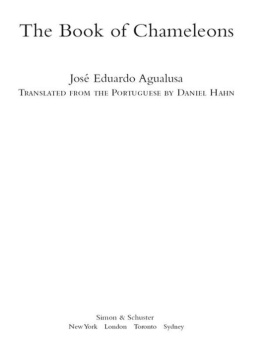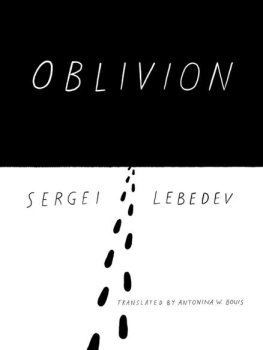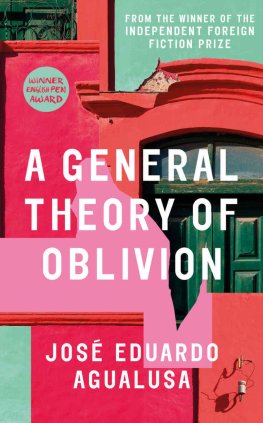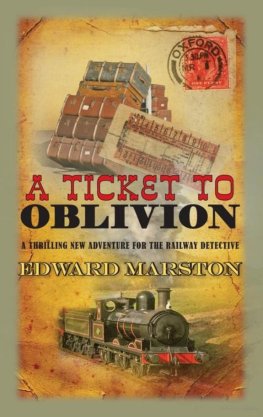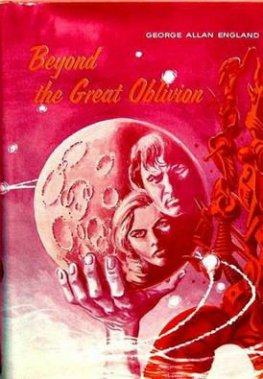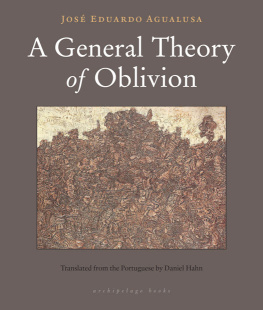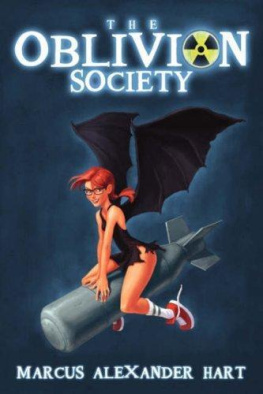Agualusa - A General Theory of Oblivion.
Here you can read online Agualusa - A General Theory of Oblivion. full text of the book (entire story) in english for free. Download pdf and epub, get meaning, cover and reviews about this ebook. City: Angola--Luanda (City), year: 2015, publisher: Penguin Random House LLC (Publisher Services), genre: Detective and thriller. Description of the work, (preface) as well as reviews are available. Best literature library LitArk.com created for fans of good reading and offers a wide selection of genres:
Romance novel
Science fiction
Adventure
Detective
Science
History
Home and family
Prose
Art
Politics
Computer
Non-fiction
Religion
Business
Children
Humor
Choose a favorite category and find really read worthwhile books. Enjoy immersion in the world of imagination, feel the emotions of the characters or learn something new for yourself, make an fascinating discovery.
- Book:A General Theory of Oblivion.
- Author:
- Publisher:Penguin Random House LLC (Publisher Services)
- Genre:
- Year:2015
- City:Angola--Luanda (City)
- Rating:4 / 5
- Favourites:Add to favourites
- Your mark:
- 80
- 1
- 2
- 3
- 4
- 5
A General Theory of Oblivion.: summary, description and annotation
We offer to read an annotation, description, summary or preface (depends on what the author of the book "A General Theory of Oblivion." wrote himself). If you haven't found the necessary information about the book — write in the comments, we will try to find it.
A General Theory of Oblivion. — read online for free the complete book (whole text) full work
Below is the text of the book, divided by pages. System saving the place of the last page read, allows you to conveniently read the book "A General Theory of Oblivion." online for free, without having to search again every time where you left off. Put a bookmark, and you can go to the page where you finished reading at any time.
Font size:
Interval:
Bookmark:


Copyright Jos Eduardo Agualusa, 2013
English translation copyright Daniel Hahn, 2015
First published as Teoria Geral do Esquecimento by Publicaes Dom Quixote,
2013, in Portugal.
By arrangement with Literarische Agentur Mertin Inh. Nicole Witt, e.k.,
Frankfurt am Main, Germany.
First Archipelago Books Edition, 2016
All rights reserved. No part of this book may be reproduced or transmitted in any form without the prior written permission of the publisher.
Archipelago Books
232 3rd Street #A111
Brooklyn, NY 11215
www.archipelagobooks.org
Library of Congress Cataloging-in-Publication Data
Agualusa, Jos Eduardo, 1960
[Teoria geral do esquecimento. English]
A general theory of oblivion / Jose Eduardo Agualusa;
translated by Daniel Hahn.
pages cm
eISBN 978-0-914671-32-9 (paperback)
1. Women hermits Angola Luanda Fiction.
I. Hahn, Daniel, translator. II. Title.
PQ9929.A39T4713 2015
869.342dc23 2015018851
Aviso Navegao A Brief Introductory Look at the Kuvale Shepherds copyright Ruy Duarte de Carvalho, INALD, 1997.
Excerpt from FERNANDO PESSOA & CO. by Fernando Pessoa, translation copyright 1998 by Richard Zenith. Used by permission of Grove/Atlantic, Inc and SLL/Sterling Lord Literistic, Inc. Any third party use of this material, outside of this publication, is prohibited.
Cover art: Jean Dubuffet, La butte aux visions (Knoll of Visions), 1952
Archipelago Books gratefully acknowledges the generous support from Lannan Foundation, the Direo-Geral do Livro, dos Arquivos e das Biblietecas, and the New York State Council of the Arts, a state agency.

Distributed by Penguin Random House
www.randomhouse.com
v3.1
Ludovica Fernandes Mano died in Luanda, at the Sagrada Esperana clinic, in the early hours of October 5, 2010. She was eighty-five years old. Sabalu Estevo Capitango gave me copies of ten notebooks in which Ludo had been writing her diary, in the first years of the twenty-eight during which she had shut herself away. I also had access to the diaries that followed her release as well as to a huge collection of photographs taken by the visual artist Sacramento Neto (Sakro) of Ludos texts and charcoal pictures on the walls of her apartment. Ludos diaries, poems, and reflections helped me to reconstruct the tragedies she lived through. They helped me, I believe, to understand her. In the pages that follow, I have made use of much of her first-hand account. What you will read is, however, fiction. Pure fiction.
Ludovica never liked having to face the sky. When still only a little girl, she was horrified by open spaces. She felt, upon leaving the house, fragile and vulnerable, like a turtle whose shell had been torn off. When she was very small, six, seven years old, she was already refusing to go to school without the protection of a vast black umbrella, whatever the weather. Neither her parents annoyance nor the cruel mockery of the other children deterred her. Later on, it got better. Until what she called The Accident happened and she started to look back on that feeling of primordial dread as something like a premonition.
After the death of her parents, Ludo lived in her sisters house. She rarely went out. She earned a little money giving Portuguese lessons to bored teenagers. Besides this, she read, embroidered, played the piano, watched television, cooked. When night fell, she would go over to the window and look into the darkness like somebody leaning out over an abyss. Odete, irritated, shook her head:
Whats the matter, Ludo? Scared of falling into the stars?
Odete taught English and German at the high school. She loved her sister. She avoided travel so as not to leave her by herself. She spent her holidays at home. Some of her friends praised her selflessness, others criticized her for being excessively indulgent. Ludo couldnt imagine living alone. And yet she worried that she had become a burden. She thought of the two of them as Siamese twins, joined at the navel. Her, paralyzed, almost dead, and the other, Odete, forced to drag her along wherever she went. She felt happy, she felt terrified, when her sister fell in love with a mining engineer. His name was Orlando. A widower, childless. He had come to the Portuguese city of Aveiro to resolve some complicated issue to do with an inheritance. An Angolan, originally from Catete, he lived between Angolas capital and Dundo, a town run by the diamond company for which he worked. Two weeks after theyd met, quite by chance, in a patisserie, Orlando asked Odete to marry him. Expecting her to turn him down, being familiar with Odetes reasons, he insisted that Ludo would come to live with them in Angola. The following month they were set up in a huge apartment on the top floor of one of the most luxurious buildings in Luanda. The so-called Prdio dos Invejados that is, the building of those who inspire envy.
The journey was hard for Ludo. She left home in a daze, under the effects of tranquilizers, moaning and protesting. She slept the whole flight. The following morning, she awoke to a routine similar to that shed had back home. Orlando owned a valuable library, thousands of titles, in Portuguese, French, Spanish, English, and German, among which almost all the great classics of universal literature were to be found. Ludo had access to more books now, while also to less time, because she insisted on dispensing with the two maids and the cook, taking charge of all the domestic chores herself.
One evening, the engineer arrived home carefully carrying a large cardboard box. He handed it to his sister-in-law:
This is for you, Ludovica. To keep you company. You spend too much time alone.
Ludo opened the box. Inside, looking fearfully at her, she found a little white newborn puppy.
Hes a male. A German shepherd, Orlando explained. They grow quickly. This ones an albino, rather unusual. He shouldnt get too much sun. What are you going to call him?
Ludo didnt hesitate:
Phantom!
Phantom?
Yes, he looks like a phantom. All white like that.
Orlando shrugged his bony shoulders.
Very well. Then Phantom he shall be.
An elegant, anachronistic wrought-iron staircase climbed in a tight spiral from the drawing room up to the terrace. From there, your eyes could take in a good part of the city, the bay, the Ilha promontory, and out in the distance a long necklace of abandoned beaches fringed by the fine lacework of the waves. Orlando took advantage of the space to construct a garden. A bower of bougainvillea threw a scented lilac shade over the coarse brick floor. In one of the corners grew a pomegranate tree and several banana trees. Guests used to be surprised:
Bananas, Orlando? Is this a city garden or the backyard of a farm?
The engineer would get annoyed. The banana trees reminded him of the large yard, hemmed in by adobe walls, where he had played as a boy. If it had been up to him, he would have planted mango trees, too, and medlar trees, and lots of papaya plants. When he came home from the office, that was where he used to sit, a glass of whisky within arms reach, a black cigarette alight between his lips, watching as night conquered the city. Phantom would be there with him. The puppy also loved that terrace. Ludo, meanwhile, refused to go up. In the first few months she did not even dare approach the windows.
Next pageFont size:
Interval:
Bookmark:
Similar books «A General Theory of Oblivion.»
Look at similar books to A General Theory of Oblivion.. We have selected literature similar in name and meaning in the hope of providing readers with more options to find new, interesting, not yet read works.
Discussion, reviews of the book A General Theory of Oblivion. and just readers' own opinions. Leave your comments, write what you think about the work, its meaning or the main characters. Specify what exactly you liked and what you didn't like, and why you think so.

